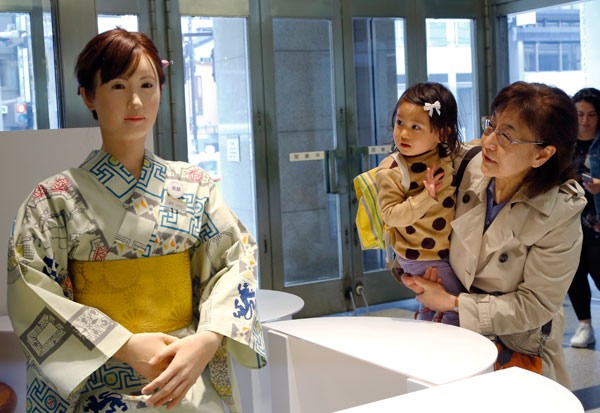Baidu chasing Google in race to create real AI
By Yang Yang ( China Daily ) Updated: 2015-04-25 07:31:49
 |
|
Customers watch android robot Aiko Chihira at the reception of Mitsukoshi department store in Tokyo. The lifelike android robot marked its first day at work as a receptionist at the department store, greetings customers as they walked in. [Photo by/Shizuo Kambayashi/Associated Press] |
To see if a computer can think like a human, he fashioned a test, later called the Turing Test, in which a computer is submitted to a five-minute blind assessment given by human questioners. A computer is deemed to have passed the test if more than 30 percent of its answers are mistaken for having been given by a human being.
In June 2014, media reports claimed that "the 65 year-old iconic Turing Test was passed for the very first time by supercomputer Eugene Goostman during Turing Test 2014 held at the renowned Royal Society in London".
However, some researchers questioned the success by pointing out that by making the computer a 13-year-old boy from Ukraine gave it an advantage, as when it provided some odd answers in English. Others identified the supercomputer as only a chatbot without artificial intelligence, and said many other chatbots - including Cleverbot that achieved 59 percent in 2011 - had also claimed to have passed the test. But they are not AI.
One of the most exciting achievements in the development of AI technology in recent years is the breakthrough made by Google's DeepMind team in London.
The team's Deep Q-Network algorithms can learn to play new computer games like Breakout or Spaceship Invaders. Gradually, the algorithms will play better and better by accumulating experience in previous rounds, and in some cases, they can even develop new strategies.
"Whether robots can overtake human beings depends on the learning ability of robots," says Qu Daoqui, chief executive officer of Siasun Robots & Automations in Shenyang.
Christopher G Atkeson, professor in the Robotics Institute and Human-Computer Interaction Institute at Carnegie-Mellon University, is one of the scientists who help to create the lovely inflatable caregiver robot Baymax in the animation film, Big Hero 6.
"I believe this achievement is the best of its kind at learning to play video games. I believe these learning techniques are also doing well in speech recognition and vision," he says in an e-mail response to China Daily, referring to Google's efforts.
"This is a step forward, but not a complete solution to AI," he qualifies. One of the bottlenecks for AI is "we do not yet have a general theory of how thinking works. We can (only) develop algorithms for specific tasks."
|
|
|
|
|
|
|
|

























 Raymond Zhou:
Raymond Zhou: Pauline D Loh:
Pauline D Loh: Hot Pot
Hot Pot Eco China
Eco China China Dream
China Dream China Face
China Face






